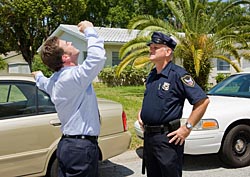Vehicle Code 31 VC – Giving False Information to a Police Officer – states, “No person shall give, either orally or in writing, information to a peace officer while in the performance of his duties under the provisions of this code when such person knows that the information is false.” 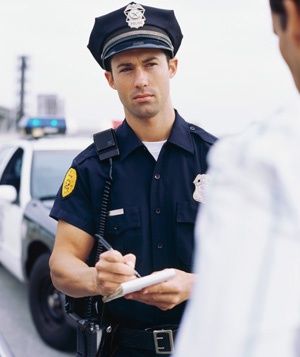
You could be charged with this offense if you: give a police officer a false name, a fake driver’s license, counterfeit registration (which would also be a violation of Vehicle Code 4463 VC California’s fraudulent vehicle registration law), and giving an answer to a question that you know is false – just to name a few.
This offense is considered a misdemeanor and you face up to six months in jail and a $1,000 fine if you are convicted.
In addition, giving false information to an officer who is performing his/her duties may also be considered a violation of:
- Penal Code 148 PC – California’s law against resisting, delaying, or obstructing an officer engaged in the performance of his/her duties,
- Vehicle Code 20 VC – California’s law against making false statements to a California Highway Patrol officer, and/or
- Penal Code 472 PC – California’s law against forging, counterfeiting, or possessing a fraudulent seal (if, for example, you present an officer with a fake or counterfeit driver’s license that bears a “seal” supposedly issued by the California Department of Motor Vehicles).
If you are also convicted of these offenses you face increased or additional punishments.
If you have been charged with giving false information to a police officer, you need an experienced and aggressive attorney to fight to have your charge reduced or dismissed. Call the Law Office of William Daley at (619) 238-1905 for a free consultation.


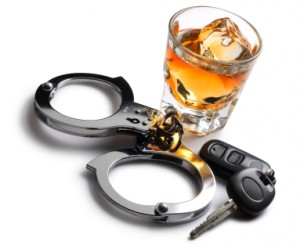 While a first DUI does carry a potential 6 month jail term, very rarely will that happen. Most people can complete an alternative program like Work Release (picking up trash at the jail) in lieu of jail time. The best way to know if you are facing jail time is to contact an experienced DUI attorney. Our law firm specializes in DUI defense, so
While a first DUI does carry a potential 6 month jail term, very rarely will that happen. Most people can complete an alternative program like Work Release (picking up trash at the jail) in lieu of jail time. The best way to know if you are facing jail time is to contact an experienced DUI attorney. Our law firm specializes in DUI defense, so 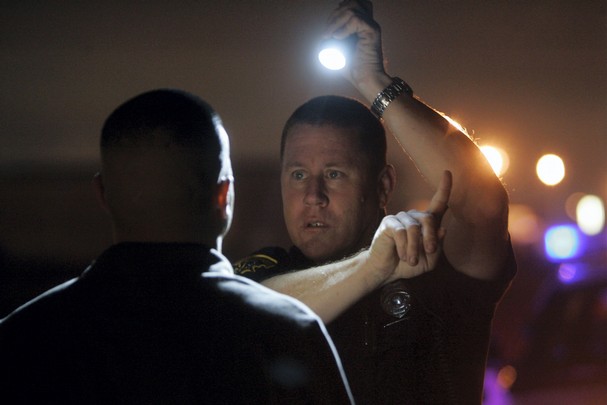 However, a skilled DUI lawyer can often reduce a first time DUI to a wet reckless, dry reckless, exhibition of speed, and sometimes have it dismissed altogether. Doing so will significantly reduce your penalties, fines, and possible jail sentence.
However, a skilled DUI lawyer can often reduce a first time DUI to a wet reckless, dry reckless, exhibition of speed, and sometimes have it dismissed altogether. Doing so will significantly reduce your penalties, fines, and possible jail sentence.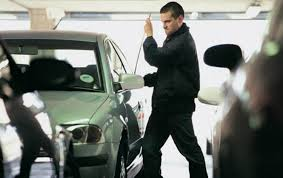
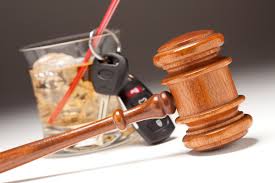 Proposal to lower DUI limit draws criticism from surprising places.
Proposal to lower DUI limit draws criticism from surprising places.
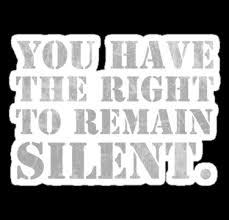
 The terms DUI and DWI are acronyms. They stand for the terms Driving Under the Influence and Driving While Intoxicated. The two terms generally mean the same thing…that your driving ability was impaired because of alcohol or drugs. Some people may not have ever even heard of one or the other terms. This is because some state laws refer to it only as DUI and other states call it DWI. Some states use both terms, having slightly different meanings.
The terms DUI and DWI are acronyms. They stand for the terms Driving Under the Influence and Driving While Intoxicated. The two terms generally mean the same thing…that your driving ability was impaired because of alcohol or drugs. Some people may not have ever even heard of one or the other terms. This is because some state laws refer to it only as DUI and other states call it DWI. Some states use both terms, having slightly different meanings.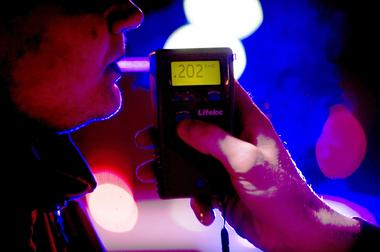
 When arrested, there are two ways to be released before your court date. Someone can pay what is called a “cash bail”, or they can go through a bail bonds company. Paying a cash bail is when someone pays the full amount of bail to the court directly. That person will be refunded that money, minus specific court fees, once the case is over. Going through a bail bonds company will allow the person to only have to come up with usually 10% of the bail amount. The 10% however, is not refundable.
When arrested, there are two ways to be released before your court date. Someone can pay what is called a “cash bail”, or they can go through a bail bonds company. Paying a cash bail is when someone pays the full amount of bail to the court directly. That person will be refunded that money, minus specific court fees, once the case is over. Going through a bail bonds company will allow the person to only have to come up with usually 10% of the bail amount. The 10% however, is not refundable.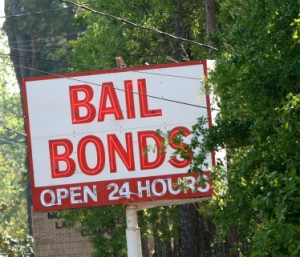
 A common phrase from alleged victims in domestic violence cases, is “I don’t want to press charges”. This is a common misunderstanding of the law which is caused by television dramas and people who think they know how the law works. Often, in these types of dramas, the reported victim is asked whether he or she wants to press charges against the accused abuser. In the State of California, it is not the decision of the victim’s that dictates whether charges will be filed or not. The decision whether or not to file a criminal complaint (or press charges) is in the discretion of the prosecution.
A common phrase from alleged victims in domestic violence cases, is “I don’t want to press charges”. This is a common misunderstanding of the law which is caused by television dramas and people who think they know how the law works. Often, in these types of dramas, the reported victim is asked whether he or she wants to press charges against the accused abuser. In the State of California, it is not the decision of the victim’s that dictates whether charges will be filed or not. The decision whether or not to file a criminal complaint (or press charges) is in the discretion of the prosecution.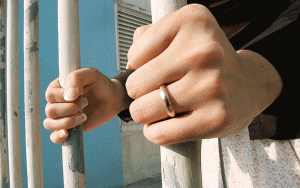
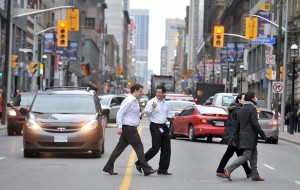 “Jay” refers to a foolish rural person who is unfamiliar with city ways. Jaywalking refers to a pedestrian who violates traffic laws in regards to crossing a street or road. These laws are made to protect individuals from injury or fatalities. Jaywalking is considered an infraction.
“Jay” refers to a foolish rural person who is unfamiliar with city ways. Jaywalking refers to a pedestrian who violates traffic laws in regards to crossing a street or road. These laws are made to protect individuals from injury or fatalities. Jaywalking is considered an infraction.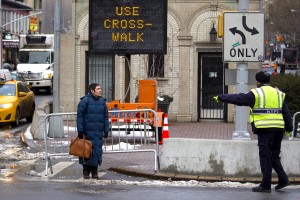 “shall obey the instructions of any official traffic signal applicable to him and placed as provided by law, unless otherwise directed by a police or traffic officer or when it is necessary for the purpose of avoiding a collision or in case of other emergency.” Stop signs are not considered “traffic signals” but “official traffic control devices” instead. Unfortunately, some police officers do consider it a traffic signal and may write a ticket in your name.
“shall obey the instructions of any official traffic signal applicable to him and placed as provided by law, unless otherwise directed by a police or traffic officer or when it is necessary for the purpose of avoiding a collision or in case of other emergency.” Stop signs are not considered “traffic signals” but “official traffic control devices” instead. Unfortunately, some police officers do consider it a traffic signal and may write a ticket in your name.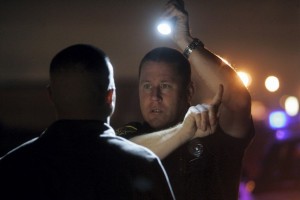 Field sobriety tests (“FSTs”) are both physical and mental exercises that police officers use for DUI investigations. If you perform poorly on these exercises they will try and use this against you in an attempt to show a mental and/or physical impairment from alcohol or drug consumption.
Field sobriety tests (“FSTs”) are both physical and mental exercises that police officers use for DUI investigations. If you perform poorly on these exercises they will try and use this against you in an attempt to show a mental and/or physical impairment from alcohol or drug consumption.
